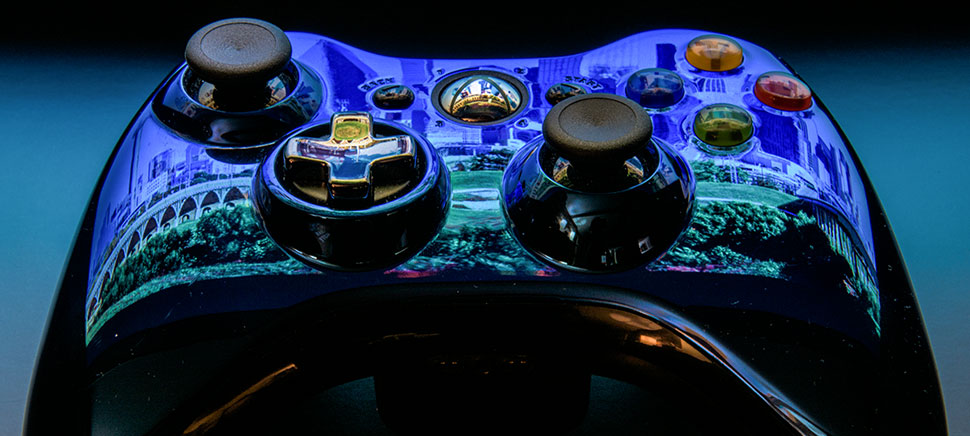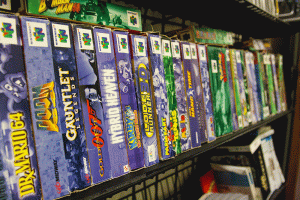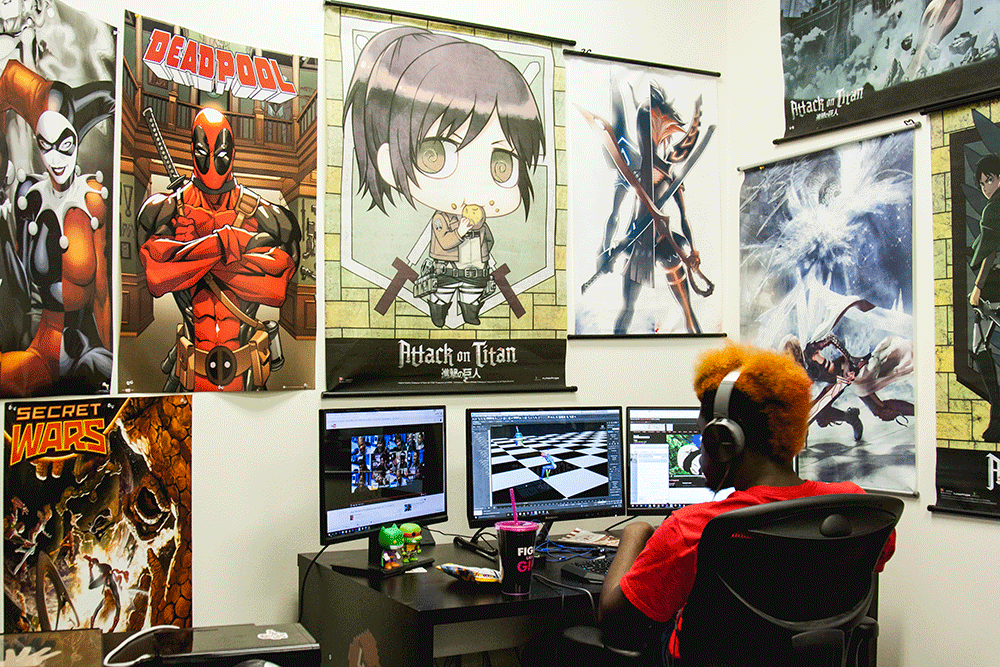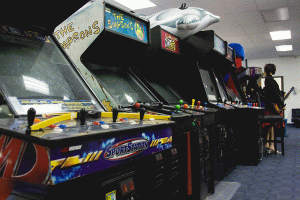NORTH TEXAS STAYS ON TOP OF THE GAMING INDUSTRY THROUGH REGENERATION
When SMU Guildhall student Ashleigh Mills was given a prompt from Blizzard Entertainment that asked her to “imagine what Starbucks would look like in the World of Warcraft game,” she came up with a colorful, imaginary world where virtual coffee shops existed next to warlords and wizards.
“She was the winner of the contest, and they ended up hiring her,” Guildhall director Gary Brubaker says. “She’s now an artist on the ‘World of Warcraft’ team.”
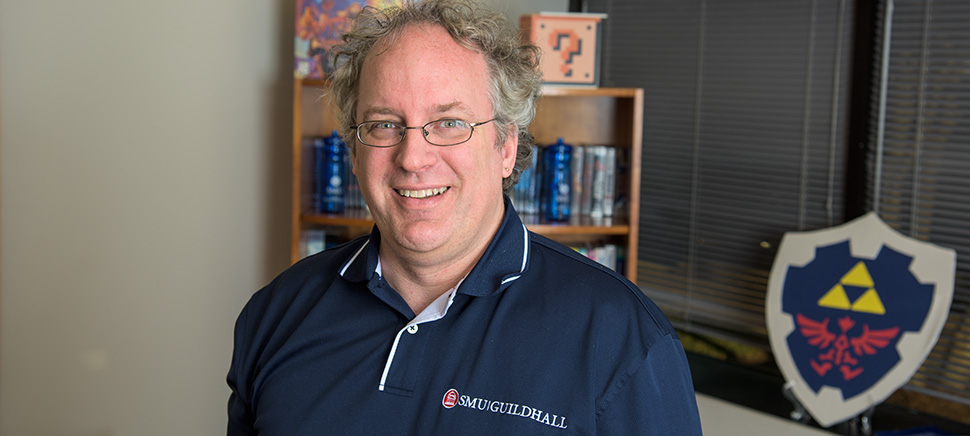
Gary Brubaker, Director of The Guildhall at Southern Methodist University. Photo by Michael Samples.
The Guildhall at SMU, which offers a masters degree program in video game development and boasts about 630 alumni in its 14-year history, is one of a number of campuses in North Texas preparing students for the next wave of video game technology and design. But it is just one chapter in the region’s rich history and role in the world of gaming.
THE GENESIS OF ‘DOOM’
At its core, the Dallas area’s role in the world of gaming starts with one man: John Carmack. The legendary developer co-founded id Software with John Romero and others in 1991. The company then famously developed “Doom” in 1991 and “Quake” in 1996.
At its core, the Dallas area’s role in the world of gaming starts with one man: John Carmack.
“In the era they started, it really was a time—unlike now—where two guys in the proverbial garage could have the breakout hit, and they were very savvy,” Brubaker says. “Not only did they have the breakout hits with ‘Doom’ and ‘Quake,’ but they made a great business of selling their technology to other companies.”
Not only were they great businessmen, the makers of “Doom” and “Quake” launched an all-new style of game with their developments. “That entire genre of game, the first-person shooter, its genesis was in Dallas. It started as garage programming, where you have a few people together, and it’s gotten larger and larger,” says Myke Sanders, co-chair of the Dallas International Game Developers Association. “You still have a lot of big first-person shooters made in Dallas.”
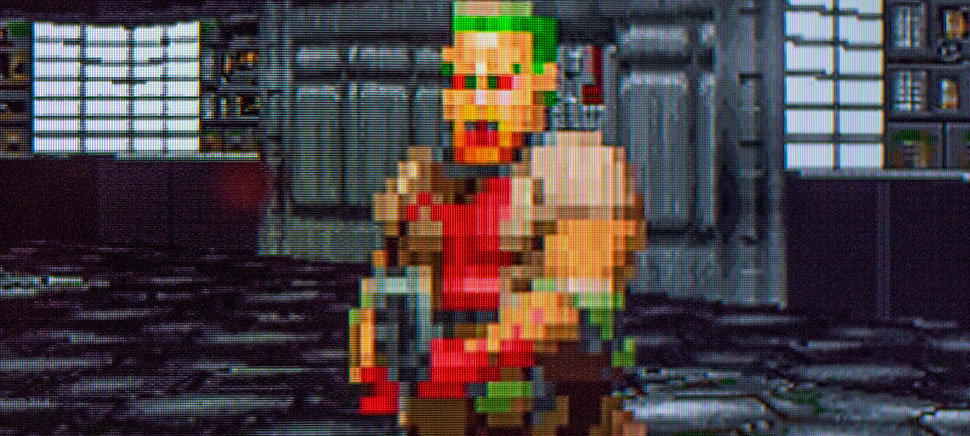
“Doom,” a first-person shooter developed by id Software, was a groundbreaking game when it was released in 1993. Photo by Michael Samples.
Since creating that first-person style of game, Carmack has again branched off. He now leads Oculus, a virtual reality developer.
But yet, even with this powerful start to the gaming industry in Dallas, Brubaker and others admit that the industry itself tends to be a bit unstable—after all, companies rely on hits in order to stay on top.
POWERING UP
So how has Dallas managed to keep this industry strong over a period of decades in such a boom-and-bust field? By regenerating.
One example is Ensemble Studios, which created megahit “Age of Empires.” Microsoft eventually bought the company, as evidence of its success, but when numbers fell, the studio closed.
“I heard people say, ‘Is Dallas now no longer going to be a center?’” Brubaker says. “Look what happened—we got three studios, one of which got us ‘Words With Friends,’ one of them gave us ‘Castleville,’ and both companies got acquired for huge sums of money. And then you’ve got Robot Entertainment, which has been very successful. So we took one company and made three.”
Similarly, the company that developed “Castleville,” called Zynga Dallas (formerly Bonfire Studios), shut down in 2013. But its closure led to the opening of Boss Fight Entertainment that same year—yet another development company in McKinney. “It truly is a creative destruction that generates new businesses,” Brubaker says. “In some sense, you could go back to id Software, and all the local companies, at some level, are descendants.”
Of course, there are certain factors at play that allow a dying company to branch off into multiple new ventures. It’s no coincidence that this happens to occur in North Texas over and over again.
CREATIVITY ISN’T JUST ON THE WEST COAST
“The big thing with Dallas is that it’s cheaper to do business here,” says Craig Skistimas of ScrewAttack, a production studio that produces videos for the gaming community. “You can’t beat the cost of living. If you want to make good games, it doesn’t matter where you make them. Creativity is something you can find anywhere; it doesn’t need to be just on the West Coast.”
And clearly, more and more businesses are realizing that. Dallas and Austin have both become hubs for the gaming industry, outside of the usual coastal regions such as Seattle, Los Angeles, and San Francisco. “Texas is the second-largest game development state behind California,” says Dallas International Game Developers Assocation’s Sanders. “There are 80 studios that I know in the area. Seven employ more than 10 people.”
“Not many people know how much happens in Dallas,” Sanders says. “I start listing off titles.
Most people are like, ‘That’s crazy.’No,” he says, “it’s not.”
Internationally speaking, major players include Kyoto, Tokyo, and Montreal. Brubaker says that companies tend to cluster because of the nature of video games—they are project based, like movies, so teams and companies need to have talent pools right at their fingertips as new developments arise. But still, when the international gaming community comes together at conventions, many are surprised to learn of Dallas’ storied past.
DALLAS: A HUB FOR GAMING
“Not many people know how much happens in Dallas,” Sanders says. “I start listing off titles. Most people are like, ‘That’s crazy.’ No,” he says, “it’s not.”
Guildhall alumni have worked on titles such as “Skylanders,” “Elder Scrolls,” and “Epic Monkey.” Gearbox Software, which is in the process of moving its Plano headquarters to Frisco, has produced titles such as “Borderlands,” “Half-Life,” and “Battleborn.”
In 2013, PricewaterhouseCoopers forecasted that the video-game market would expand to $83 million by 2016 worldwide. Today, that figure has been updated to predict $93 billion by 2019.
So how can North Texas get the word out about its role and success in the gaming industry?
“We’ve got to get big-name players out to tournaments,” Sanders says. “They don’t want to have to fly so much. Dallas is dead center to everywhere, including South America and Central America.”
One other emerging factor is the Videogame History Museum, scheduled to open in Frisco in early 2016. Its three founders—John Hardie, Sean Kelly, and Joe Santulli—are syncing their backgrounds in videogame store ownership and vintage game collecting to compile what will be one of the country’s largest assemblages of video game memorabilia. The location makes sense, especially taking into account that Randy Pitchford is moving his company, Gearbox Software, to the same city.
“Frisco is looking like it’s going to be the epicenter of gaming,” Sanders says.
“Frisco is looking like it’s going to be the epicenter of gaming,” Sanders says.
The museum will help ensure that the Dallas–Fort Worth area continues to be a major gaming hub for whatever comes next.
THE NEXT GENERATION
On the newer end of the scale, gaming enthusiast David Fares has been working to bring the community together by launching the Video Game Open Coffee Club, a group that meets to discuss gaming news and trends ever Thursday morning in downtown Plano. A similar club for the startup scene acted as his inspiration for the July 2014 launch.
“It started because I wanted to meet more game developers. I really liked the format, because although it’s a moderated discussion, it’s really an open discussion about any topic we want to bring up,” he says. “We have this specific set of knowledge that we understand. We’re finding a way to bring it all together and continue talking.”
In addition to the small, weekly gatherings, the group hosts larger mixers with both corporate and independent developers once a month, attracting a larger crowd. A true product of his generation, Fares used Twitter, Facebook, Meetup, and good, old-fashioned word-of-mouth to spread the news.
“When I moved to Dallas, I had no idea there was any sort of gaming industry here,” he says. “It’s a city filled with a lot of talent from a development perspective. Dallas is really unique in that it’s really well connected for a city across so many areas. There’s an interwoven connection between suburbs and Dallas proper.”
“When I moved to Dallas, I had no idea there was any sort of gaming industry here,”David Fares says. “It’s a city filled with a lot of talent from a development perspective.”
That’s something that Skistimas of ScrewAttack knows very well, having worked since 2006 to reach out to the gaming community in Dallas and abroad. His company began strictly with a video podcast series on the gaming industry, which then grew to include owning a game store, hosting an annual conference called SGC, and taking up a role in game development and publishing.
Today, he boasts 2.5 million viewers on his company’s YouTube channel and 30 million views per month—a figure that rivals those of large cable networks. And it’s his choice to develop this audience from Dallas-Fort Worth that has allowed the company to flourish.
“There are very few companies that have done what we’ve done, for as long as we’ve done it. ScrewAttack’s tagline has been ‘something original every freakin’ day,’” he says. “The walls are starting to break down a little bit, with the accessibility of all these programming tools at your fingertips. Everything you want to deal with, from a gaming perspective, is in Dallas.”
Interactive timeline: Gaming in Dallas-Fort Worth
North Texas has played a major role in the gaming industry for more than two decades.
READ MORE IN THE SERIES:
History of Innovation: The Aviation Industry
How DFW took flight as a world leader
History of Innovation: The Gaming Industry
History of Innovation: The Fashion Industry
For what’s new and next in Dallas-Fort Worth innovation, subscribe to our Dallas Innovates e-newsletter.

